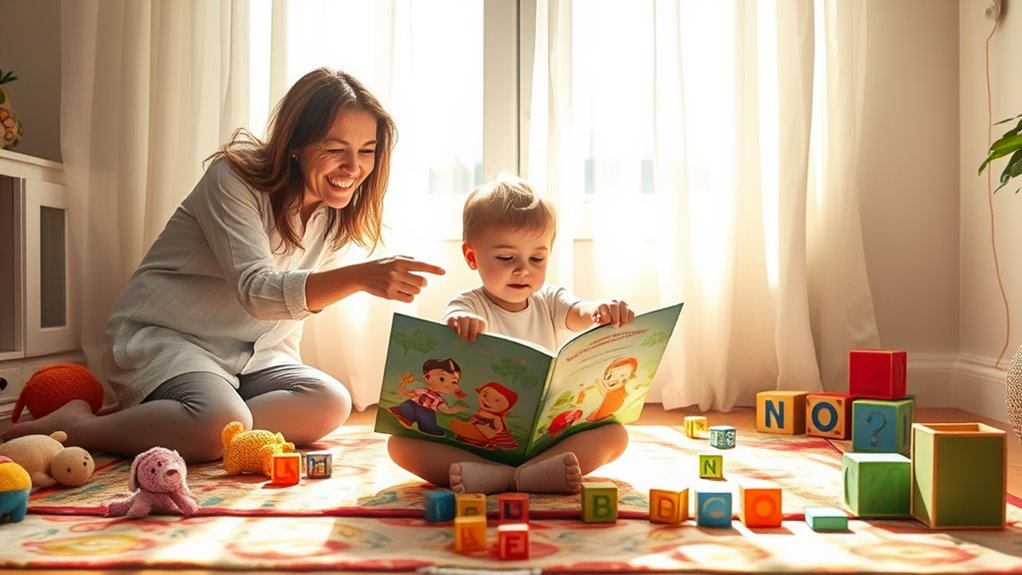The Importance of Early Literacy Skills in Child Development
When you think about your child’s development, early literacy skills probably don’t come to mind first, but they’re essential. These abilities lay the groundwork for cognitive, emotional, and social growth, shaping how your child interacts with the world. Engaging in simple activities can enhance their vocabulary and critical thinking, setting them up for future success. However, many parents overlook how these early experiences influence long-term outcomes. So, what specific strategies can you implement to nurture these skills effectively?
Understanding Early Literacy Skills
Early literacy skills are essential building blocks for a child’s development, and they encompass more than just reading and writing. They include listening, speaking, and even singing! When you engage your child in conversations, you’re helping them build vocabulary and understand different ways to express themselves. It’s like giving them tools for their language toolbox.
Playing with sounds, like rhyming words or clapping syllables, can turn into a fun game that strengthens their phonemic awareness. Ever tried making silly rhymes? It’s not just fun; it also helps them recognize patterns in language.
You can also read aloud to them. Choose books with colorful pictures and exciting stories. This sparks their imagination and helps them connect words with meanings.
Don’t forget to encourage your little one to tell their own stories, too! Whether it’s a tall tale about a dragon or a funny story about their day, it boosts their confidence and creativity.
Cognitive Development Benefits
Through engaging in early literacy activities, you’ll notice significant cognitive development benefits for your child. When you read together, you’re not just flipping through pages; you’re opening doors to new ideas and concepts. This sparks imagination and encourages critical thinking. It’s like giving their brain a fun workout!
As your child explores stories, they begin to understand cause and effect. “Why did the character make that choice?” you can ask. This helps them analyze situations and think ahead, much like a little detective.
Plus, vocabulary expands dramatically! The more words they hear, the more they can express their thoughts and feelings, which is super important for communication.
Don’t forget about memory skills! Remembering plots, characters, and lessons from books boosts their memory capacity. You might even notice them recalling details from stories days later. It’s like a magic trick for their brains!
Emotional Growth Through Reading
While you immerse yourself in stories with your child, you’re not just nurturing their cognitive skills; you’re also fostering emotional growth. Each tale you read together opens a door to new feelings and experiences. When characters face challenges or celebrate victories, kids can relate those moments to their own lives. They learn to understand emotions like joy, sadness, fear, and excitement, which helps them make sense of their feelings.
As you turn the pages, your child might giggle at a funny moment or feel a little teary during a sad part. These reactions are valuable! They help kids recognize and express their emotions, building their emotional intelligence.
Plus, discussing these feelings after reading can deepen your bond. Ask questions like, “How do you think the character felt?” or “What would you do in that situation?” This encourages your child to think critically about emotions.
Social Skills and Interaction
In the cozy moments spent reading with your child, you’re not only igniting their imagination but also enhancing their social skills and interaction. When you immerse yourself in stories together, your child learns how characters communicate, express emotions, and solve conflicts. They begin to understand that words can build connections, just like a bridge made of sentences!
As your child listens to different tales, they pick up on language cues and social norms. They start to grasp the importance of sharing, taking turns, and even empathizing with others. You might notice them mimicking dialogue from their favorite characters, which is a great way for them to practice conversation. It’s like playacting, but with a literary twist!
Moreover, discussing the stories afterward gives your child a chance to express their thoughts and feelings, helping you both bond over shared experiences. You can ask questions like, “What would you do in that situation?” or “How do you think the character felt?”
These simple prompts encourage them to articulate their ideas, boosting their confidence in social settings. So, grab a book, snuggle up, and let those social skills flourish, one story at a time!
Strategies for Parents
To foster early literacy skills effectively, parents can implement a variety of engaging strategies that make reading a delightful experience.
First, try incorporating reading into your daily routine. Whether it’s bedtime stories or reading while waiting for dinner, make it a fun habit! Choose books that grab your child’s interest—anything from superheroes to silly animals.
Next, don’t hesitate to get interactive! Ask questions about the story, like “What do you think will happen next?” This not only keeps them engaged but also sparks their imagination. And remember, it’s okay to act out the characters! Bonus points for silly voices!
Another great idea is to create a cozy reading nook. Fill it with comfy cushions and soft lighting to make reading feel special. You could even have a “reading challenge” where you both try to read a certain number of books each month.
Lastly, be a role model! Let your child see you enjoying books, too. When they see you read, they’ll want to join in.
Role of Educators
Educators play an essential role in nurturing early literacy skills, setting the foundation for a child’s lifelong love of reading. You’re not just teaching letters and sounds; you’re opening the door to imagination and adventure!
By creating engaging lessons, you help kids explore stories that transport them to different worlds, making learning feel like an exciting quest.
You can encourage curiosity by asking open-ended questions. Instead of simply telling them what a word means, ask them what they think it means. This sparks their imagination and gets them thinking critically.
Plus, using fun activities like storytelling, puppetry, or even silly rhymes can make learning feel like playtime.
Let’s not forget the importance of modeling reading behavior. When kids see you enjoying a book, they’re more likely to follow suit. Your passion for reading can be contagious!
Lastly, remember to celebrate their progress, whether big or small. A simple “Great job!” can boost their confidence.
Creating a Literacy-Rich Environment
A literacy-rich environment can greatly enhance the early literacy skills you’ve started to cultivate. Imagine walking into a cozy room filled with bookshelves brimming with colorful stories. You’ll want to create spaces where reading and writing are part of everyday life. Hang up some fun alphabet posters, and don’t forget to include a comfy reading nook!
Books shouldn’t just sit on a shelf; they should be everywhere! Place them in the living room, the kitchen, and even the car. When you read together, point out words, ask questions, and share your thoughts. It’s like being on a treasure hunt for stories!
Encouraging your little ones to scribble, draw, or even write their own stories is essential too. Grab some paper and crayons, and let their imaginations run wild.
And let’s not forget about playing word games—who doesn’t love a good game of Scrabble or a round of I Spy?
Creating this kind of environment makes reading and writing feel like fantastic adventures. With your support, your child will grow up with a love for literacy that lasts a lifetime!
Assessing Literacy Progress
Tracking your child’s literacy progress is essential for understanding their growth and development. It helps you see what’s working and what might need a little extra attention. Start by keeping an eye on their reading habits. Are they excited to pick up books, or do they view reading like a chore? You can also listen to them read aloud. This way, you can catch any tricky words or mispronunciations, and maybe even share a laugh over a funny mistake!
Another great way to assess progress is by asking questions about the stories they read. If they can summarize the plot or describe their favorite character, that’s a sign they’re absorbing information. You might even create a fun chart to track new words they learn each week. Kids love visuals, and it can motivate them to keep learning.
Don’t forget to celebrate achievements, big or small! A sticker for finishing a book or a high-five for sounding out a tough word can go a long way.
Long-Term Impact on Learning
Early literacy skills lay the foundation for a child’s future learning experiences. When kids learn to read and write early, they open a treasure chest of knowledge that can last a lifetime.
Imagine going on a grand adventure where books are the maps! If a child struggles with literacy, it can feel like trying to navigate without a compass.
As they grow, those early skills help them tackle more complex subjects in school. You know how math and science have their own language? Well, reading is like that too!
Kids who grasp early literacy often excel in these areas, making learning more enjoyable and less intimidating. They’re more likely to participate in class and express their thoughts clearly, which is a huge confidence booster.
Plus, strong literacy skills can impact their social skills. When they can communicate well, they build friendships and work better in groups.




